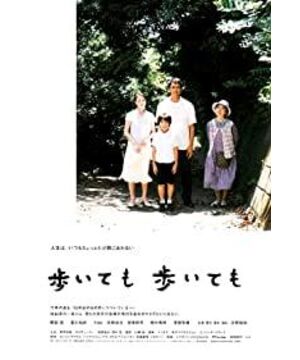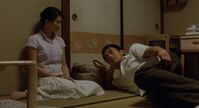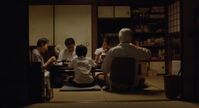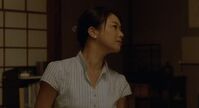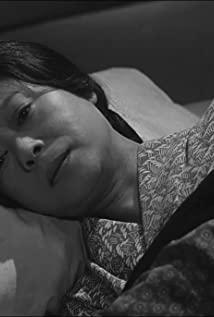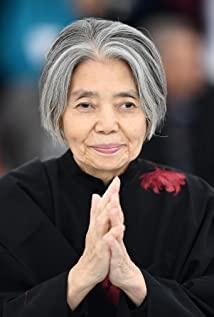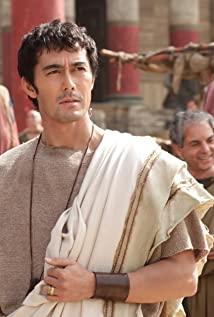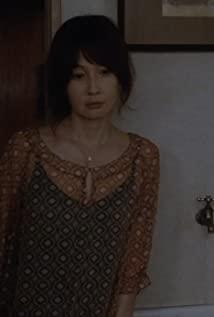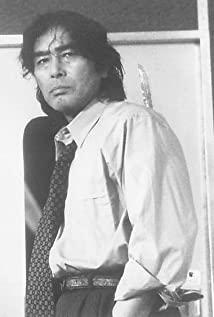It's a little strange, I have an almost obsessive love for this film and the novel of the same name written by the director later. Although it is written by Hirokazu Koreeda and in the lens, life is the most bland and trivial. But unfortunately, on weekdays, I don't like life.
Of course, I don't want a lot of life, at least not for the first half of his life. Resigned, remarried, unemployed, and silent, Abe Hiroyal acted as a middle-aged man whose salary could not last for ten days in the form of "more mourning than mourning". He was overwhelmed, unable to open his mouth when his mother talked about his memories, unable to let go of his heart under the shadow of his deceased brother, and did not hesitate to escape this powerlessness by not going home for many years.
The day he returned to his home in Hengshan was the most common summer in Japan. The cicadas were roaring, the temperature was scorching, the trains were dangling, and the streets of the town were quiet. He climbed the stone steps that he hated as a child, stopped and walked, and the sunlight filtered through the large area. The leaves fell under their feet, and many were carrying large watermelons. In the summer of my childhood, watermelon was immersed in cold well water. In the afternoon, when the sun began to be poisonous, I cut several large pieces and sat on the floor to eat. The fan revolved with tremors, and the tatami was vibrated. At that time, many dreams were also to become the doctor that my father wanted him to be.
But children don't grow up the way their parents want, and parents don't grow up the way we want. As if father is not so omnipotent, there are always more and more things he can't, and many of our ideas he no longer approve. Nor do we jump high after childhood, we may have struggled just to take one step forward. The unspeakable gap between the young and the old has become a thorn in the hearts of the two generations. When you say it, the thorn is like a fire, burning your heart.
This is reciprocal, as we gradually reconcile, it seems that there is always a little too late.
I like the expression of Hirokazu Kore-eda, taking movies as prose, slow, common, and kind of beautiful brushwork, revealing the trivialities of life, filtering out the heaviness, not by lines and dramas, but by recorded footage, There, the whereabouts of life passed by quietly, at first I thought it was ordinary, but when I hesitated again, I realized that this was life.
Time flows like water, and when you get it, you lose it, and what you lose will never be seen again. When did those trivial and trivial conversations stop.
Maybe it's jealousy at work. I occasionally laugh at the ordinary life of others, but when I catch a glimpse of other people's family life, ramble, get together and separate, I feel moved, it's the true face of life, and I feel lost after reading it.
Perhaps this is the charm of the movie.
I want to live in a world created by Hirokazu-eda. But we can't escape. When we grow up to a certain juncture, we blindfold our parents and tell them that I am fine and I will deal with it. Therefore, they wrap up the memories and hide the us who have not yet grown up, who they hope for. And what we have in common are memories. But until we understand that life is short and we keep walking, we may not know the story of our parents, and of course we may not know how helpless and sentimental the loss is.
The choice for most of us, like many, is to wait for time to dissolve.
I think of the many essays my mother had written. He wanted to be a doctor, just like his father. Many grabbed it and shredded it. You see, he's still afraid to express, he's not even ready for his past self, what he's missing is now what he longs for and fears.
Mother said that as long as the white butterfly survives the winter, it will turn into a yellow butterfly and fly back the next year. Time goes forward, life goes down, and the more you want it to stop, the more likely it will go downhill. Look at it this way, the trials that life gives are not partial to anyone. When a lot of people understood the harshness and sadness of his mother, he, like his mother, sprinkled a spoonful of water in front of the tomb in the summer.
I think the movie is about this kind of thing: time. And the obsession, sadness, reconciliation, and nostalgia it brings.
In our life, who has tamed who. Time is a very magical thing, it is cute and hateful, and a little arrogant. It slows down when you're overwhelmed, it doesn't show mercy when you're on guard. It can only let you take some away when you have something, and let you sail alone after the crowd, with regret and no choice but to say, life should be like this.
In short, it keeps moving.
The more I say it, the more I know I can't dissolve it. I want to live in Hirokazu-eda's world, which is true.
We are used to seeing life, and think it is calm but the dark tide is turbulent, but it is actually more like watching the sunrise in the morning, the thin fog is in front of you, you don’t know where the sea level is, but the dark blue mountains are behind , you can only see a faint light, and if you wait for a while, you can always see the openness behind the hazy, don't be afraid, the fog is gone, you are still there.
View more about Still Walking reviews


